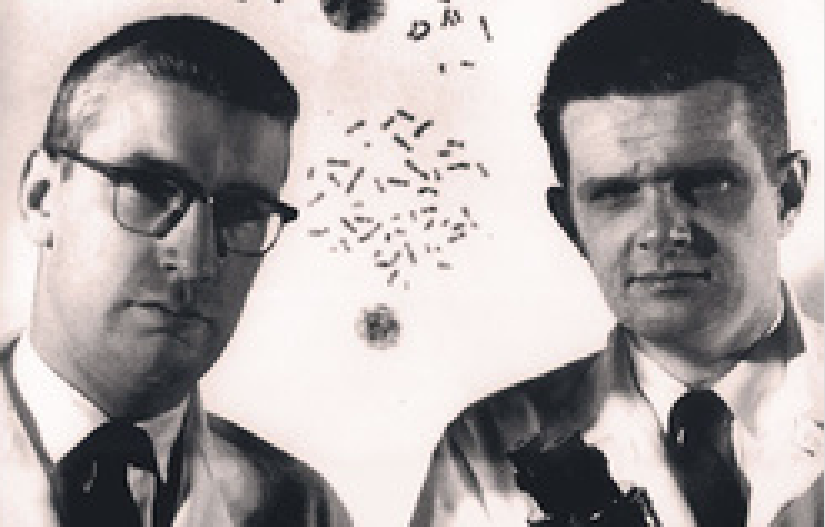Baseball is the subject of many artistic creations and scientific studies. Movies such as “Field of Dreams”, “Bull Durham”, and “Moneyball” depict baseball embedded in the larger American culture. Books such as the elegant “Game Time: A Baseball Companion”, by Roger Angell, are a literary pleasure even for someone only peripherally familiar with the game. And baseball has also engendered a broad culture of analysis through applied physics. The pitch is an object of particular fascination for the physics-inclined baseball fan.… Read the rest “fastball: movement and speed – updated”
Chronic Myeloid Leukemia: a Molecular Diagnosis
Peter Nowell and David Hungerford in 1960
Chronic Myeloid Leukemia (CML) is not a cancer you hear about very often. That’s not because it isn’t serious — until recently, it carried a frightening prognoses. Until about 2000, newly diagnosed CML patients had a 5-year survival rate of 31%. But we don’t hear much about CML because it is a rare disease, and affects far fewer people than cancers of the breast or prostate, or lung cancer.… Read the rest “Chronic Myeloid Leukemia: a Molecular Diagnosis”
Chronic Myeloid Leukemia: A Molecular Solution
Dr. Brian Druker and Ms. LaDonna Lopossa, one of the earliest patients to benefit from Gleevec
Rob Schick is the Branch Manger of the Baird Wealth Management Group in Portland, Oregon. Most people would probably consider him lucky. For starters, Portland is one of the most desirable cities in the United States to live in. He and his wife have three grown children, one of whom works at the same company. In addition to his success in business, Rob Schick’s efforts on behalf of the Knight Cancer Institute, where he has helped raise millions of dollars for research, were nationally recognized in 2015 by a National Community Service Award from the Invest in Others Foundation.… Read the rest “Chronic Myeloid Leukemia: A Molecular Solution”
The Gila River People, Victims of Modernity
The present-day Gila River in the Gila Box Riparian National Conservation Area in southeast Arizona.
Both nature and nurture affect human obesity. For some people, and for some populations, the genetic tendency to become obese is not fulfilled because of their environment, the circumstances of their lives. But when those circumstances change, the genetic potential may be realised quickly, and lead to the medical issues that follow from obesity. An example that starkly illustrates this comes from the sunbaked desert south of Phoenix, Arizona.… Read the rest “The Gila River People, Victims of Modernity”
The Trouble With Roundup
RE-WRITTEN and UPDATED
If there were a contest to name the most-hated chemical, Roundup, the brand name for the chemical glyphosate, would have a very good chance of winning. It has been identified as not only a plant poison, but also a destroyer of monarch butterflies, an impoverisher of developing-world farmers, and a probable carcinogen. These are serious issues. But they are also complex, and not completely settled (except for it being a plant poison).… Read the rest “The Trouble With Roundup”
Speed Limits
Jesse Owens starting the 200 meter race at the 1936 Olympics. Reproduction of photograph in “Die Olympischen Spiele, 1936” p.27, 1936.
Coverage of the recent victory of the New Zealand team in the America’s Cup yacht race featured sailboats flying along on their underwater foils at ridiculous speed, speeds reaching more than 50 miles (80 km) per hour. Whether it’s running, or driving a car, or sailing these mutant boats, speed is exciting.… Read the rest “Speed Limits”
A Nice Book
There’s a great book about vitamin A, “Brilliance & Confusion: Saving Children’s Vision & Lives With Vitamin A”. Okay, I confess. It’s my own book a couple of years ago. Vitamin A was discovered in 1913, but it has continued to provide surprises since. The most important of these is that it isn’t essential just for vision, which is what most people know about it. Rather, it is needed to maintain many functions necessary for health, and life itself.… Read the rest “A Nice Book”
GMO
It’s a good idea to look critically at any powerful new technology, and the creation of genetically-modified organisms, GMOs, is no exception. Like any new technology, it might have unanticipated, deleterious consequences that outweigh any benefit. Many criticisms of GMO have of course been raised, as a brief interrogation of the internet will show. But unfortunately, the criticisms of GMOs we hear most often are not the most important ones, and the ones that are most important are often not heard clearly.… Read the rest “GMO”
Malaria: No Simple Solutions
(Bald Eagle and Hawk Mountain scenery. Image courtesy of David Dehner.)
UPDATED
Hawk Mountain, a picturesque site in southeastern Pennsylvania, is on the eastern slopes of the Appalachians. These mountains create an updraft that helps raptors, large birds of prey such as hawks and eagles, on their migratory flights between their northern summer habitats and their wintering sites in the southeast United States. They are also somewhat of a bottleneck, causing large numbers of raptors to converge in their flight paths and pass over Hawk Mountain.… Read the rest “Malaria: No Simple Solutions”
Your travels are Written in your body
Our bones, teeth and hair carry in them an encrypted GPS log of where we’ve been. If you lived in Seattle through your childhood and moved to Chicago ten years ago, that is indelibly written there. There will also be a record of what you’ve eaten recently. Advances in the science and technology of reading that information are having an impact on forensics, anthropology and agriculture, among other pursuits. At the heart of that technology lies a fundamental property of matter, which is that many of the atoms that make up all of creation come in subtle variations, variations that we are able to detect with great precision.… Read the rest “Your travels are Written in your body”










